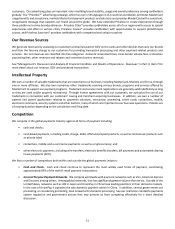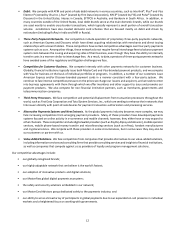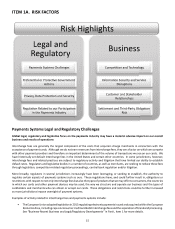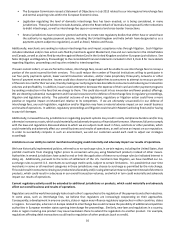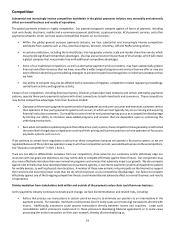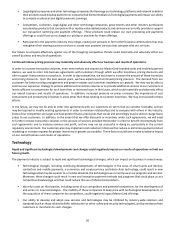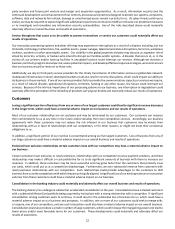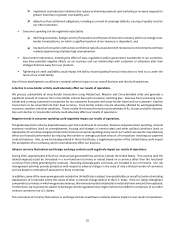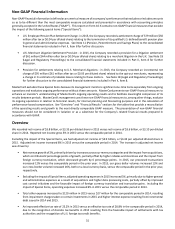MasterCard 2015 Annual Report Download - page 27
Download and view the complete annual report
Please find page 27 of the 2015 MasterCard annual report below. You can navigate through the pages in the report by either clicking on the pages listed below, or by using the keyword search tool below to find specific information within the annual report.21
• Our ability to develop evolving systems and products may be inhibited by any difficulty we may experience in attracting
and retaining technology experts.
• Our ability to adopt these technologies can also be inhibited by intellectual property rights of third parties. We have
received, and we may in the future receive, notices or inquiries from patent holders (for example, other operating
companies or non-practicing entities) suggesting that we may be infringing certain patents or that we need to license
the use of their patents to avoid infringement. Such notices may, among other things, threaten litigation against us or
our customers or demand significant license fees.
• We work with large digital companies and other technology companies that use our technology to enhance payment
safety and security and to deliver their payment-related products and services quickly and efficiently to consumers. Our
inability to keep pace technologically could negatively impact the willingness of these customers to work with us, and
could encourage them to use their own technology and compete against us.
We cannot predict the effect of technological changes on our business, and our future success will depend, in part, on our ability
to anticipate, develop or adapt to technological changes and evolving industry standards. Failure to keep pace with these
technological developments or otherwise bring to market products that reflect these technologies could lead to a decline in the
use of our products, which could have a material adverse impact on our results of operations.
Information Security and Service Disruptions
Information security failures or breaches could disrupt our business, damage our reputation, increase our costs and cause
losses.
Information security risks for payments and technology companies such as MasterCard have significantly increased in recent
years in part because of the proliferation of new technologies, the use of the Internet and telecommunications technologies to
conduct financial transactions, and the increased sophistication and activities of organized crime, hackers, terrorists and other
external parties. These threats may derive from fraud or malice on the part of our employees or third parties, or may result from
human error or accidental technological failure. These threats include cyber-attacks such as computer viruses, malicious code,
phishing attacks or information security breaches.
Our operations rely on the secure processing, transmission and storage of confidential, proprietary and other information in our
computer systems and networks. Our customers and other parties in the payments value chain, as well as our cardholders, rely
on our digital technologies, computer and email systems, software and networks to conduct their operations. In addition, to
access our products and services, our customers and cardholders increasingly use personal smartphones, tablet PCs and other
mobile devices that may be beyond our control. We routinely are subject to cyber-threats and our technologies, systems and
networks have been subject to cyber-attacks. Because of our position in the payments value chain, we believe that we are likely
to continue to be a target of such threats and attacks. Additionally, geopolitical events and resulting government activity could
also lead to information security threats and attacks by affected jurisdictions and their sympathizers.
To date, we have not experienced any material impact relating to cyber-attacks or other information security breaches. However,
if one or more of these events occurs, it could lead to security breaches of the networks, systems or devices that our customers
use to access our products and services which could result in the unauthorized disclosure, release, gathering, monitoring, misuse,
loss or destruction of confidential, proprietary and other information (including account data information) or data security
compromises. Such events could also cause service interruptions, malfunctions or other failures in the physical infrastructure
or operations systems that support our businesses and customers (such as the lack of availability of our value-added systems),
as well as the operations of our customers or other third parties. Any actual attacks could lead to damage to our reputation with
our customers and other parties and the market, additional costs to MasterCard (such as repairing systems, adding new personnel
or protection technologies or compliance costs), regulatory penalties, financial losses to both us and our customers and partners
and the loss of customers and business opportunities. If such attacks are not detected immediately, their effect could be
compounded.
We maintain an information security program, a business continuity program and insurance coverage (each reviewed by our
Board of Directors and its Audit Committee), and our processing systems incorporate multiple levels of protection, in order to
address or otherwise mitigate these risks. We also periodically test our systems to discover and address any potential
vulnerabilities. Despite these mitigation efforts, there can be no assurance that we will be immune to these risks and not suffer
losses in the future. Our risk and exposure to these matters remain heightened because of, among other things, the evolving
nature of these threats, the prominent size and scale of MasterCard and our role in the global payments and technology industries,
our plans to continue to implement our digital and mobile channel strategies and develop additional remote connectivity solutions
to serve our customers and cardholders when and how they want to be served, our global presence, our extensive use of third-


